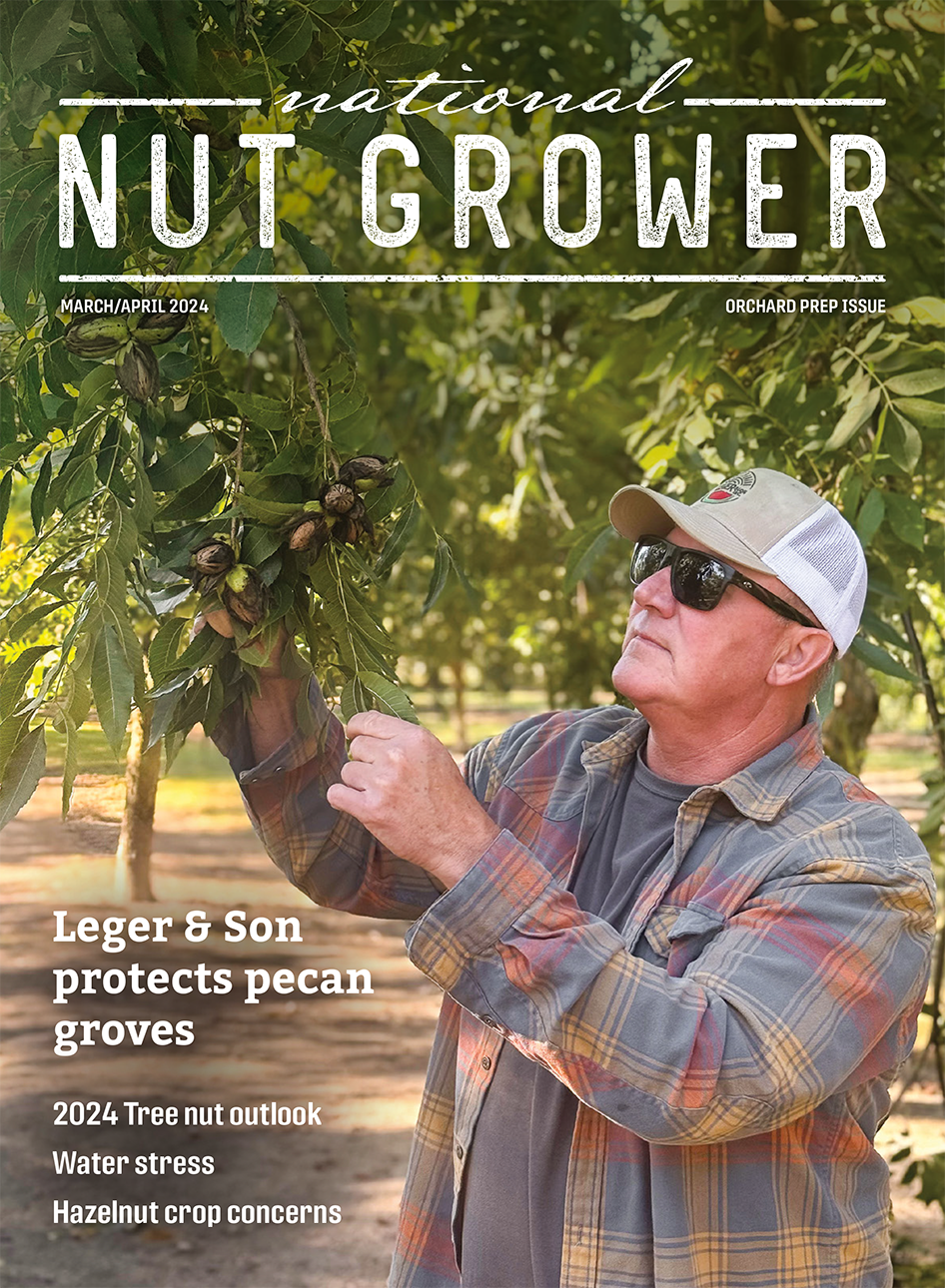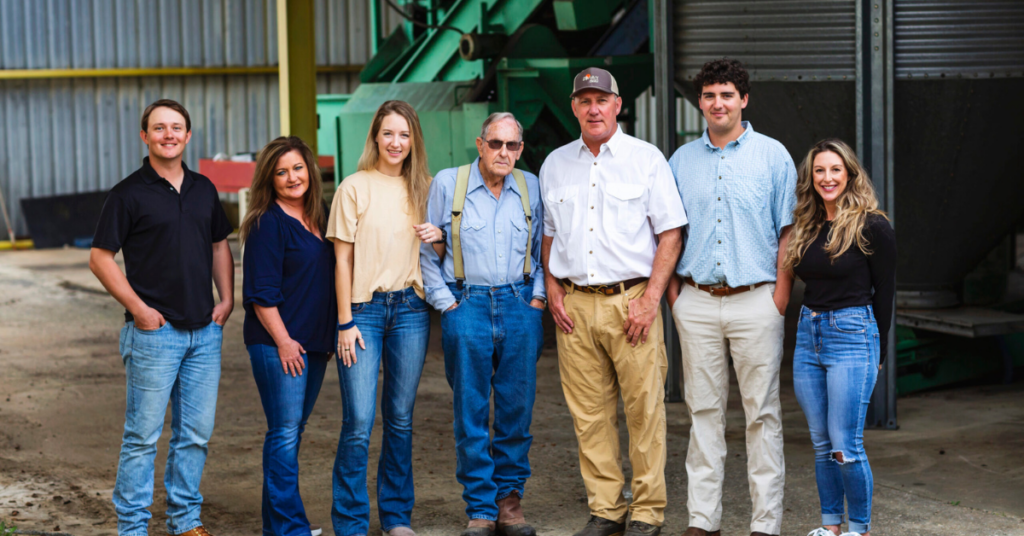
March/April 2024
Leger & Son hedges to protect pecan groves from hurricanes
Leger & Son grows pecans by conserving water, paying attention to soil health and vigorously trimming trees. Sustainable practices have allowed the third- generation Cordele, Georgia, family operation, which is also a major watermelon grower-shipper, to successfully grow pecans for nearly six decades.
Leger & Son’s toolbox includes precision ag techniques, monitoring fields with drones and using tensiometers and moisture meters for conserving irrigation water. In the past decade, overhead and drip fertigation has allowed the proper mixture of minor essentials to increase yields and reduce the use of pesticides, fertilizers and water, said Greg Leger, president and owner.
Planting pecan trees more resistant to scab helped cut the spraying bill in half. During spring growth and leafing, clover and vegetable cover crops harbor beneficial insects including lacewings that feed on aphids.
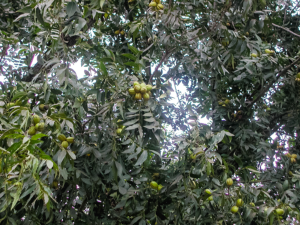
Planting buffers around groves helps reduce insect issues. “We cut way back on insecticides in the orchard and cut our spray bill in half,” Leger said.
During the last 15 years, pecan weevils have become a smaller issue. “We have just about eradicated the pecan weevil,” Leger said. “It’s like the boll weevil in cotton. It’s just about a thing of the past anymore.”
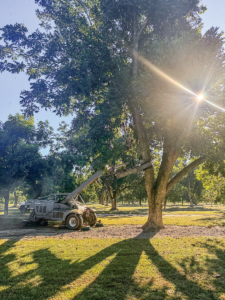
Long rainy periods can create disease pressure, so most pecan spraying challenges originate from adverse weather. A contract sprayer cutting off sprays early can produce weak trees, Leger said.
Growers who neglect to spray and water as necessary or don’t do everything they can to successfully make a crop could find themselves kicked by Mother Nature, Leger said. Because higher yields are needed in today’s farm economy, Leger & Son grows pecans on more high density trees. To make trees more vigorous, the company is cutting the canopy and doing more pruning.
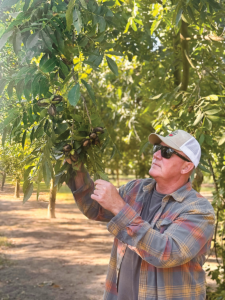
An increasing number of tropical storms and hurricanes, and their expanding reach inland, are affecting more Georgia growers. In 2023, hurricanes Michael and Irma devastated Georgia groves and fields, with 90 mph winds in Cordele, Leger said.
Maintaining lower tree canopies with hedging helps resist storm damage and increases tonnage, Leger said.
A more common practice in the western U.S. pecan growing regions, more southeastern growers began adopting hedging in the mid-2010s, according to the University of Georgia Cooperative Extension. By controlling tree size, hedging allows spray machines to better reach treetops for improved coverage, which affords easier scab control. It also opens trees to more sunlight in the orchard and maintains a high tree density.
While costly in labor, hedging is a no-brainer if it allows a grove to survive wind damage, Leger said. After a recent hurricane leveled a block of 10-year old pecan trees, another block of the same age that had been hedged had up to two-thirds less damage, he said.
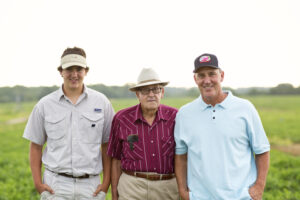
“If you haven’t cleaned up from a hurricane, you can’t prune fast enough,” Leger said.
Hedging against storms
“We’ve found that when you let the root system catch up with the canopy of the tree, it withstands higher winds,” Leger said. “We want to bring the canopy down, making the tree turn into a bush more. It’s fruiting more, so we’re getting more yields to the acre by hedging.”
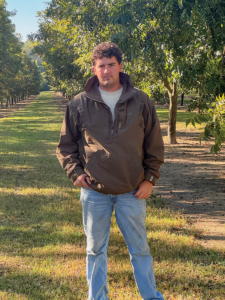
Pecan growers hedge on a three-year program. The cutting crew hedges the top left side of one row of trees, cutting at 45-degree angles, then hedges the other side. The following year, another third of the orchard is hedged followed by the other third the third year.
Growers can expect a yield loss after the first hedging, and expect to clean up wood during the initial hedging. However, once a grower gets into the program, because it’s new growth being hedged every three years, there isn’t as much wood to cut.
In the past, the practice wasn’t as common for Georgia pecans. Leger & Son began hedging pecan trees in 2020. In the last 15 years, Leger & Son has focused on soil monitoring and ensuring trees receive adequate nutrition.
“A lot of farmers have really been studying and managing harder, making sure they have happy plants and trees,” Leger said. “When you start getting weak plants, it’s like the insects can smell it. When you have nice, strong plants, you don’t have as much predatorial pressure from insects.”
In the summer when harvesting watermelons, Leger & Son deploys full-time labor in the orchard, performing foliar leaf samples, monitoring soil moisture and staying on spray and fungicide schedules as well as checking for nutrient deficiencies.
“You want your pH levels to be perfect,” Leger said. “If your pH is not where it needs to be, if you need NPK (nitrogen, phosphorus and potassium) and don’t have your pH right, it’s not making that plant, it’s not making that in the soil and is not making it readily available so the plant can take it up.”
Avoiding ‘unforced errors’
A key part of Leger & Son’s success is avoiding mistakes.
“No self-inflicted problems are the ultimate goal,” Leger said. “In the last 15 years, farming is more risky. I’ve seen the sloppy growers go by the wayside. I don’t mean that in a bad way, as I could go by the wayside with one hurricane.”
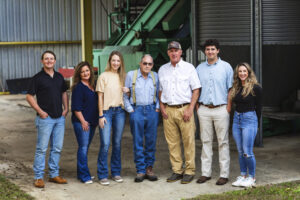
Today’s farming practices have evolved into precision ag, he said.
“You have to dot every ‘i’ and cross every ‘t’ and manage as best as you can with the least amount of waste,” Leger said. “You cannot cut corners and you can still get your butt kicked. Not doing things properly the first time, having to go back and do them again, drives me crazy. Self-inflicted wounds are the worst.”
After leaving the Navy, Charles M. “Buddy” Leger worked for years as a USDA inspector in south Georgia, grading peanuts and other commodities before managing the Cordele State Farmers Market. In 1965, he started growing and shipping watermelons and also planted pecan trees on his father’s farm. Buddy established a buying point for watermelons and pecans.
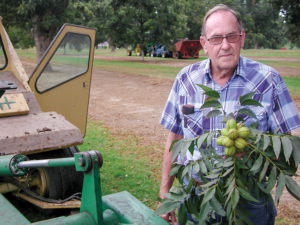
Now 92, Buddy keeps track of the business but spends more time working in his garden and at his lake home with his wife Marjorie.
Greg’s daughter Bailey works in marketing with Jordan Carter, director of sales and marketing, while son Cole is in field operations working with Will Hinson, vice president of operations. In 2021, Carter became the first woman elected National Watermelon Promotion Board president. Carter and Hinson are en route to company ownership. Bailey and Cole joined the business after college and started working at the bottom, like their father, who grew up throwing watermelons into semis for his father.
Greg said he learned a lot from his dad, who taught him the value of hard work and not skipping any steps.
“The harder you work, the luckier you get,” Greg said. “He never really gave me anything but opportunity. What I did with that was up to me. It’s our generation now.”







